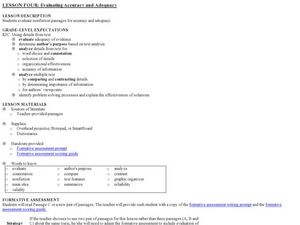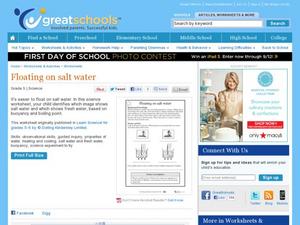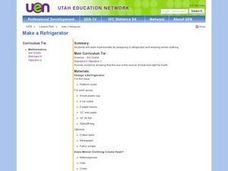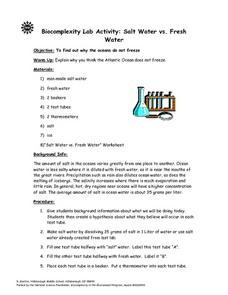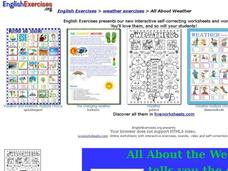Curated OER
Evaluating Accuracy and Adequacy
Evaluate non-fiction works with your English class. While practicing a variety of strategies detailed in the plan, readers compare and contrast the information in three non-fiction passages about the same topic. They then discuss the...
Curated OER
Floating on Salt Water
Mixing substances together causes their properties to change. This resource illustrates that concept for fifth graders by having them consider four questions that have to do with buoyancy and boiling point. Learners begin to understand...
Curated OER
Evaporation and Temperature Change
Students investigate the relationship between evaporation and temperature changes. In this evaporation and changes in temperature lesson, students measure the changes in temperature of different solutions on a cotton ball.
Curated OER
Ziplock Chemistry
Students investigate various chemical reactions when creating mixtures in ziplock baggies. In this chemistry lesson, students will recognize various chemical reactions and cite evidence. Safety and assessment strategies are included in...
Curated OER
Energy and Changes of State
Young scholars complete a variety of labs to help them explain how energy affects the changes in states of matter. They also be required to collect and record data, graph data, and apply interpretations of that data.
Curated OER
Make a Refrigerator
Third graders explore the concept of heat transfer as experienced in wearing winter clothing and analyzing the refrigerator.
Curated OER
Temperature (Celsius)
Third graders solve Celsius and Fahrenheit conversion problems, watch weather forecast and convert temperatures to Celsius, and design and present their own weather forecasts for different regions based on information gathered from...
Texas Instruments
Measuring Air Pressure Lab
Your class can investigate the weather through an experiment. In this chemistry lesson plan, learners collect data on air pressure and relate it to the weather. They collect data with the TI containing a barometer probe.
Curated OER
Sand or Rock? Finding Out From 1,000 km
Young scholars observe how measurements are made with different instruments. In this remote sensing activity students investigate the physical state of surfaces including the surfaces of the solar system.
Curated OER
Lights Light Up My Life
Middle schoolers conduct an investigation. For this energy conservation lesson, students observe and make predictions about fluorescent and incandescent light bulbs. Working in groups, middle schoolers conduct an investigation to...
Curated OER
Energy Efficient Homes
Students observe and gather data from a model simulated home. In this efficiency lesson students examine the factors that influence energy efficiency, complete a lab activity then draw conclusions from their data.
Curated OER
Temperature Change and the States of Matter
Tenth graders observe the processes of evaporation, condensation, melting, freezing, boiling, and sublimation. They do a quantitative investigation of the freezing of water, to explore explanations that involve particles.
Curated OER
Positive and Negative Numbers
For this positive and negative numbers worksheet, 4th graders compare 3 and -4, put 5 numbers in order from least to greatest, locate 5 numbers on a number line, fill in 6 missing numbers in a set of numbers and answer 1 word problem.
Curated OER
A Simple Thermoetric Titration
In this thermometric titration worksheet, high schoolers investigate the changes in temperature when an alkali is neutralized by an acid. Students graph their results from the titration and draw 2 best fit lines on their graph. Where the...
Curated OER
It's Rainin', It's Pouring
Students take a quick examine part of the water cycle, and the combined gas laws. The lesson lead them through the conditions necessary for cloud formation and allow them to create clouds in three different hands-on activities.
Curated OER
Salt Water vs. Fresh Water
Middle schoolers explore why the oceans do not freeze. They explain why they think the Atlantic Ocean does not freeze. Students are given background information about what they are doing. They create a hypothesis about what they...
Curated OER
Calorimetry
Students investigate calorimetry and set up equipment to measure calories. In this calorimetry lesson plan, students make a calorimeter and compare large amounts of heated water with small amounts to show the difference in calories....
Curated OER
All About Weather
In this weather vocabulary interactive worksheet, students fill in the correct vocabulary word to complete each of the eight given sentences. There is also an interactive word search to complete.
Curated OER
Our Desert Backyard
Students make observations of their own backyard. In this environment lesson, students keep records of the plants and animals they see in their home or school yard. Students make notes of how the weather and environment changes over...
Curated OER
Water Quality Monitoring
Students comprehend the four parameters of water quality. They perform tests for salinity, dissolved oxygen, pH and clarity or turbidity. Students comprehend why scientists and environmental managers monitor water uality and aquatic...
Curated OER
Record the Data and Find the Averages
Pupils record the daily outdoor temperature as well as the number of minutes of sunlight per day over a determined period. They calculate the average temperature and minutes of sunlight per day and post their data on the project website.
Curated OER
Weather Watchers - Interdisciplinary
Students investigate weather and climate through a variety of interdisciplinary activities.
Curated OER
Keep It Quiet!
Fourth graders study about sound waves and how they behave in various media. They create a soundproofed container. They explain that velocity describes a change in distance over time.


